

 |
 |
SECTION 5
A CENTRAL FUNCTION of the Office of the Family and Children's Ombudsman (OFCO) is to assure that government agencies fulfill their obligations to children and families in an appropriate and timely manner. Because the state's response to children in need of protection and to families who are the subject of allegations or findings of child abuse or neglect is so critical, OFCO dedicates most of its efforts toward activities that result in a state agency's direct and immediate response to their needs. This section provides a summary of OFCO's activities from December 2, 1997 to August 31, 1998. It describes those who initiated contact with OFCO, children affected by an agency's act or omission, the nature of complaints received, and OFCO's efforts to assist children and families through case-specific interventions. It also describes activities associated with OFCO’s administrative and systemic investigations.
Initial Contacts
OFCO received 863 contacts during the reporting period. Of these, 67 percent were:
The remaining 33 percent of contacts were either:
OFCO responded directly to inquiries and complaints, and referred all non-related inquiries to other agencies. Complaints arrived at the rate of about 6 per week, a 28 percent increase over the preceding reporting period. These complaints provide the mechanism through which OFCO is able to identify children and families at risk of harm and in need of assistance due to an agency's act or omission, and to pinpoint recurring and systemic problems that adversely affect children and families.

| Office of the Family and Children's Ombudsman |
|
Complaints
Of the 230 complaints received by OFCO, 88 percent were requests to intervene in an ongoing matter for the purpose of preventing or mitigating harm to a child or family resulting from an agency’s alleged act or omission. One-fourth of the requests identified the matter as emergent, and sought OFCO’s immediate assistance. The remaining 12 percent of complaints received by OFCO were requests to conduct an administrative investigation of a specific matter, or an investigation of a potential systemic issue.
Source of Complaints
Complaints arriving at OFCO were made mostly by parents (45 percent) who were directly affected by an agency's act or omission, or by grandparents and other relatives (27 percent). Community professionals and service providers accounted for 10 percent of complaints, while foster parents accounted for 8 percent. Complaints were evenly balanced with the state population as a whole; 78 percent of the state's population resides in western Washington, and 76 percent of the contacts were from western regions. The profile of OFCO's clientele is provided in the following tables and charts.

| Office of the Family and Children's Ombudsman |
|
Affected Children
Complaints received by OFCO involved 319 children. Children were typically young, over half were age seven or younger. About one child in four was from a racial minority group, and about one child in seven was Hispanic. One in three also had some type of physical, mental, developmental, and/or other disability.
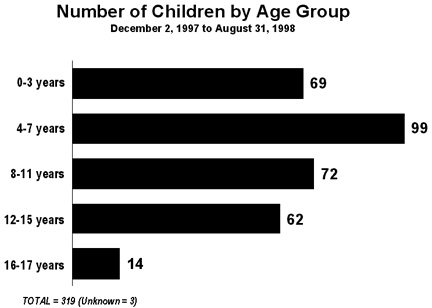
| Office of the Family and Children's Ombudsman |
|

| Office of the Family and Children's Ombudsman |
|
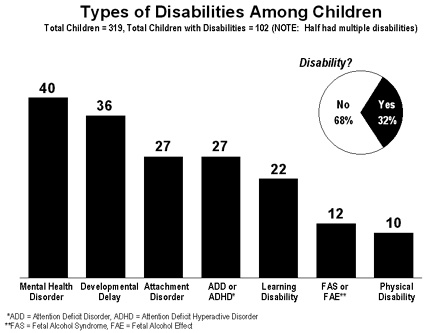
| Office of the Family and Children's Ombudsman |
|
Issues Identified by Complainants
The most frequently identified complaint issue during this period regarded child protection and safety; the next most frequent complaint issue was of unnecessary family separation and failure to reunify, followed by issues relating to children's well-being in foster care.
|
|
Number of complaints that raised the issue* |
||
|
Child Protection and Safety |
65 |
||
|
Child in need of protection due to suspected physical abuse |
18 |
||
|
Child in need of protection due to suspected neglect |
18 |
||
|
Child in need of protection due to suspected sexual abuse |
11 |
||
|
Child in need of protection because parent not capable |
7 |
||
|
Child in non-relative foster care at risk of abuse or neglect |
6 |
||
|
Child safety at risk due to recommendation to return home |
5 |
||
|
Family Separation and Reunification |
57 |
||
|
Failure to make reasonable efforts to reunify family |
19 |
||
|
Child inappropriately removed from parent’s care |
18 |
||
|
Failure to place child with relative |
16 |
||
|
Failure to provide appropriate family-child contact |
4 |
||
|
Foster Care Issues |
22 |
||
|
Unnecessary or inappropriate change in child’s foster placement |
18 |
||
|
Failure to provide for child’s mental health needs |
4 |
||
|
Adoption Issues |
14 |
||
|
Relative not considered/recommended to adopt |
9 |
||
|
Foster parent not considered/recommended to adopt |
5 |
||
|
*Some complaints raised more than one issue. |
|||
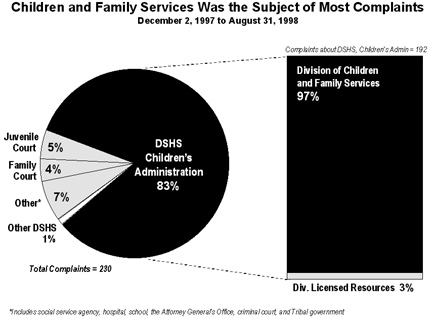
| Office of the Family and Children's Ombudsman |
|
Children’s Administration Complaints by Region, Office
|
Children’s Administration Headquarters |
5 |
|
DCFS |
DLR |
DCFS |
DLR |
|||||
|
Region 1 |
23 |
2 |
Region 4 |
36 |
0 |
|||
|
Regional Office-Spokane |
13 |
2 |
Kent/King South |
12 |
||||
|
Moses Lake |
3 |
Regional Office-Seattle |
8 |
|||||
|
Newport |
3 |
Bellevue/King Eastside |
5 |
|||||
|
Colville |
2 |
Seattle Central |
4 |
|||||
|
Wenatchee |
2 |
Seattle South |
4 |
|||||
|
Seattle North |
3 |
|||||||
|
Region 2 |
20 |
2 |
||||||
|
Toppenish |
7 |
Region 5 |
39 |
0 |
||||
|
Yakima |
5 |
1 |
Regional Office-Tacoma |
26 |
||||
|
Richland/Tri-Cities |
4 |
Bremerton/Kitsap |
13 |
|||||
|
Sunnyside |
2 |
|||||||
|
Regional Office-Yakima |
1 |
1 |
Region 6 |
38 |
1 |
|||
|
Walla Walla |
1 |
Regional Office-Lacey/Olympia |
10 |
1 |
||||
|
Vancouver |
8 |
|||||||
|
Region 3 |
26 |
0 |
Aberdeen |
6 |
||||
|
Alederwood/Lynnwood |
6 |
White Salmon |
5 |
|||||
|
Regional Office-Everett |
5 |
Shelton |
4 |
|||||
|
Oak Harbor |
4 |
Centralia |
2 |
|||||
|
Bellingham |
3 |
South Bend |
2 |
|||||
|
Monroe/Sky Valley |
3 |
Tumwater |
1 |
|||||
|
Mount Vernon |
2 |
|||||||
|
Arlington/Smokey Point |
1 |
|||||||
|
Everett |
1 |
|||||||
|
Friday Harbor |
1 |
TOTAL COMPLAINTS |
187 |
5 |
DCFS = Division of Children and Family Services
DLR = Division of Licensed Resources
|
|
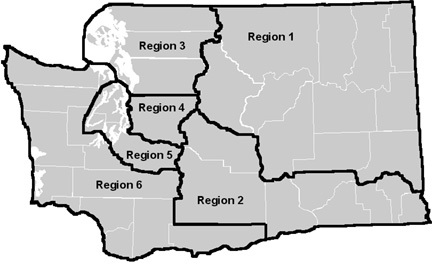
Interventions
OFCO's decisions to intervene in a matter are grounded in its unique role as an independent voice for children and families. Consistent with this role, OFCO intervenes in matters when, after a preliminary investigation, the office has concluded that an agency’s act or omission has clearly placed the interests or well being of a parent or child at risk of harm. Irrespective of the particular outcome sought by the complainant, OFCO’s interventions are aimed at preventing or mitigating harm to the child or family.
Preliminary Investigation
Prior to intervening in a matter, OFCO conducts a preliminary investigation of the agency’s alleged act or omission to determine whether it: 1) occurred as alleged; 2) constitutes a violation of law, policy or procedure; 3) is unreasonable under the circumstances; and/or 4) has had an adverse impact on a parent or child. OFCO conducts a preliminary investigation of each complaint received. A preliminary investigation generally includes a review both of the materials provided by the complainant and information available on the DSHS automated Case and Management Information System (CAMIS), as well as interviews of the complainant, front-line workers and supervisors, and others as appropriate. It may also include a review of DSHS and/or other agency case files.
Team Review
Team review meetings are held three times each month for the purpose of reviewing new requests and providing updates on matters in which OFCO has intervened. Each new request for an intervention is presented to the team by the lead ombudsman, who also describes the results of his or her preliminary investigation and provides a recommendation on whether and how OFCO should intervene. After the team discusses and evaluates the request, the director ombudsman decides whether and how OFCO will intervene. This decision is informed by team members’ diverse expertise, experiences and perspectives.
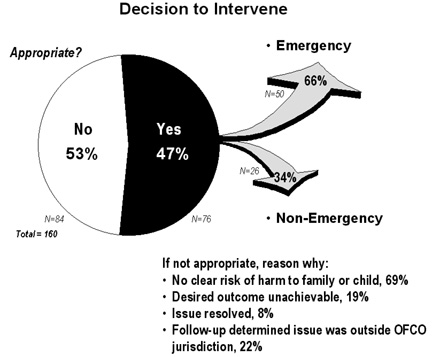
| Office of the Family and Children's Ombudsman |
|
Interventions
OFCO intervened in 47 percent of the 160 complaints requesting an intervention that were closed as of September 1, 1998. Of these interventions, 66 percent were conducted on an emergent basis, where there was reason to believe that children or families might be in imminent peril without immediate action. Issues relating to child protection and safety most frequently prompted an intervention, followed by issues relating to the health and well being of children in the state’s care.

|
|

|
|
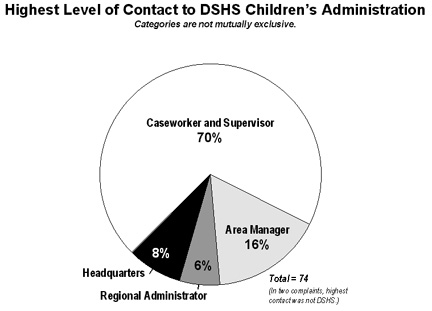
| Office of the Family and Children's Ombudsman |
|
Intervention Results
Although OFCO does not have authority to impose its recommendations directly on an agency, OFCO's interventions resulted in an agency changing its position to address OFCO's concerns in 58 percent of the 76 interventions that were completed as of September 1. Well over half of the issues OFCO gets involved in result in changes in an agency's position.
In the 32 instances where the agency did not change its position, OFCO concluded that the agency's initial position was appropriate in 26 cases, and in six complaints the agency's position was consistent with existing law or policy, but the result was nevertheless problematic. Most of these related to the unavailability of an appropriate placement resource.
Intervention Examples
Declines
Of the 160 complaints closed during the reporting period, OFCO declined to intervene in 52 percent. Although these complaints did not result in an OFCO intervention, each received a thorough investigation and careful evaluation. (Each complaint in which OFCO declined to intervene received on average almost 3 hours of preliminary investigation and evaluation.) Moreover, information from these complaints, including the subject of the complaint and the issues raised, were entered into OFCO’s automated complaint tracking system to help identify trends and patterns. Where OFCO declined an intervention, it was because OFCO:
Investigations
In addition to intervening in particular matters to prevent or mitigate harmful administrative errors, OFCO conducts administrative and systemic investigations. Administrative investigations are aimed at assessing agency compliance with law, policy or procedure, while systemic investigations are aimed at identifying system-wide problems and recommending solutions. OFCO’s investigations may be commenced upon receipt of a complaint, or upon its own initiative.
Administrative Investigations
Because OFCO dedicates most of its efforts toward direct case intervention, OFCO conducts administrative investigations only when the case clearly involves agency conduct or systemic issues that are chronic and/or seriously harmful to children and parents. As with case-specific interventions, decisions about whether to undertake a case-specific administrative investigation are made after a preliminary investigation and team review have been conducted. OFCO did not accept any of the 30 requests for an administrative investigation that were closed during the reporting period. OFCO declined to conduct a full-scale investigation of these complaints because OFCO:
Although OFCO did not undertake any administrative investigations during the reporting period, the office initiated several preliminary investigations that may result in full-scale administrative investigations in the upcoming year.
Systemic Investigations
In light of OFCO’s limited resources, it is not possible for the office to investigate all of the potential system-wide issues that adversely affect children and families. Accordingly, OFCO has, with the assistance of its advisory committees, developed criteria for selecting among potential systemic issues. These criteria give priority to issues that appear to have a seriously adverse impact on the safety, well being or permanence of children, and/or their families, and have been:OFCO received only one complaint requesting a systemic investigation. Utilizing the criteria above, OFCO decided to conduct a preliminary investigation of the systemic issue raised in that complaint. In addition, the criteria provided the basis for OFCO’s initiation of the following two systemic investigations:
Review of 1994-95 Wenatchee Child Sexual Abuse Investigations
The Wenatchee Investigations
OFCO’s Review
OFCO’s review represents the first full-scale independent review of the Wenatchee investigations by a government agency. In early 1996, United States Attorney General Janet Reno declined a request by then-Governor Lowry to undertake a review of the investigations for potential criminal civil rights violations. Reno said her office lacked jurisdiction because the allegations stated that psychological coercion, not actual physical force, had been used by investigators to elicit statements.
After conducting a four-month preliminary investigation into the issues raised in the petition, OFCO announced in October 1997 that it would conduct a targeted review of the Wenatchee cases for the purpose of identifying potential systemic problems with respect to:
Specifically, OFCO sought to determine whether new or stronger safeguards are needed to protect children who are the subject of investigative interviews, and to ensure that possible child sexual abuse victims are provided with appropriate mental health services.
OFCO’s review commenced in April 1998 and concluded in November 1998. During this period, OFCO’s investigative team reviewed over 60,000 pages of documents and interviewed over 40 individuals. To assist in understanding the diverse and complex issues presented by the Wenatchee investigations, OFCO convened a multidisciplinary panel of professionals from Washington State and across the country.
Findings and Recommendations
OFCO’s findings and recommendations are set forth in a report entitled, 1998 Review of the 1994-95 Wenatchee Child Sexual Abuse Investigations.1 In the report, OFCO found that the 1994 and 1995 Wenatchee child sexual abuse investigations present a progression with regard to the kinds of allegations that are made in child sexual abuse cases. Specifically, the investigations present a progression from the types of allegations that are:Whether the uncommon allegations occurred as alleged, or something went wrong in the child abuse investigative system resulting in factual distortions, could not be determined through OFCO’s review. The CPS investigations were not well enough documented to allow the ombudsman’s office to ascertain whether the kinds of mistakes that can cause factual distortions occurred. In addition, insurmountable constraints encountered by OFCO investigators during the course of the review made it impossible to establish the underlying facts with a reasonable degree of confidence.
Nonetheless, OFCO’s review produced the following findings and recommendations:
Interview Documentation: OFCO found that current law and CPS documentation policies are not sufficient to ensure that interviews are documented in a manner that permits meaningful external review. OFCO recommended that that CPS social workers be required to document interviews in a verbatim or near-verbatim manner that captures which questions are asked, in what order, and the exact answers given to the questions.
Child Interview Techniques: OFCO found that current law and CPS policies do not require that all CPS social workers receive specialized and ongoing training in effective interviewing techniques. Also, state-contracted mental health therapists who evaluate and treat children in state care who are possible victims of sexual abuse are not required to have specialized or on-going training about sexual abuse. OFCO recommended that specialized and on-going training in interviewing techniques be required of all CPS social workers, and that the DSHS Children’s Administration study whether state-contracted therapists should be required to have specialized and ongoing sexual abuse training.Cross Discipline Collaboration: OFCO found that CPS social workers currently collaborate with law enforcement agencies and other disciplines on child abuse investigations without the benefit of specific guidance or formal training on the goals, expectations, and limitations of such collaboration. OFCO recommended that local jurisdictions be required to establish collaborative protocols for various disciplines involved in child abuse investigations, and that joint training opportunities be enhanced for CPS social workers and other professionals.
In addition to these findings and recommendations, OFCO’s report includes a description of documented and alleged events in Wenatchee that are illustrative of investigative errors that experts agree can increase the possibility of factual distortion. The report was released to Governor Locke, the Legislature, and DSHS officials December 1998.
Guardian ad Litem Representation
OFCO’s investigation into the issue of children’s representation by guardians ad litem (GAL) was prompted by a pattern of complaints received by the office in which the affected child was reported as having no one to represent him or her in child abuse and neglect proceedings.
Federal Funding Requirements
The federal Child Abuse Prevention and Treatment Act (CAPTA) requires states receiving CAPTA grants to certify that the state has in effect, and is enforcing, a state law that for every case involving an abused or neglected child which results in a judicial proceeding, a GAL be appointed to represent the child. It is the role of the GAL "to obtain first-hand, a clear understanding of the situation and needs of the child, and to make recommendations to the court concerning the best interests of the child." Washington State receives approximately $1.25 million per biennium in CAPTA grants, and has made the required certification.
State Law
Consistent with CAPTA requirements, Washington law requires the court to appoint a GAL for children who are the subject of a dependency proceeding. However, Washington law also allows the court to decide not to appoint a GAL if it finds for "good cause" that the appointment is unnecessary. Washington State is the only state in the country with a statutory good cause exception.
OFCO’s Investigation
OFCO commenced its investigation in July 1998. OFCO investigated the number of children who are not represented by a GAL in child abuse and neglect proceedings by collecting data on the number of children in Washington State who are the subject of such proceedings, and the number that have been appointed a GAL to represent their best interests. The Washington Office of the Administrator for the Courts (OAC) provided OFCO with numerical data in several areas. OAC data were clarified, verified, and augmented in telephone interviews with county officials.
Findings
OFCO’s investigation produced the following findings:
Recommendation
Based on these findings, OFCO made three recommendations:
These findings and recommendations are set forth in OFCO’s Report on Guardian ad Litem Representation of Children in Child Abuse and Neglect Proceedings.2 The report was released to Governor Gary Locke, the Legislature, and superior court officials in January 1999.
1The report may be obtained by contacting OFCO, or by accessing OFCO's web page at: www.governor.wa.gov/ofco.
2The report may be obtained by contacting OFCO, or by accessing OFCO's web page at: www.governor.wa.gov/ofco.